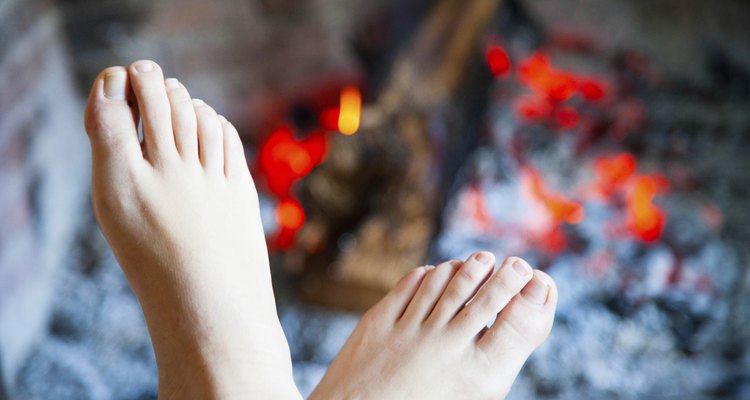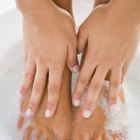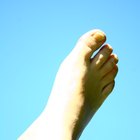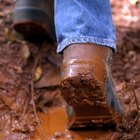
Caracarafoto/iStock/Getty Images
Foot odor can be embarrassing. The combination of sweat, dead skin cells and bacteria, especially in closed shoes, naturally causes some odor, and is easy to prevent and treat. More difficult is athlete's foot, a fungus that thrives in dark moist places and is easy to contract at public showers and pools.
Bacteria
The most common cause of foot odor in women is bacteria. Bacteria is everywhere, even on your skin. If your feet are dry and clean, generally there will be no odor. If your feet are damp or sweating bacteria will feed on the sweat and dead skin cells and produce an unpleasant odor. This is especially true when you wear closed shoes and socks or stockings that retain moisture.
Athlete's Foot
Athlete's foot is caused by a fungus which is very contagious. It is easy to contract athlete's foot if you walk barefoot in wet areas, such as public showers, pools or locker rooms. You will develop red, cracked painful skin with an unpleasant odor. Because the fungus is contagious, it can spread to others in your house who may share the same bathtub, shower or bathroom.
Diabetes and Other Diseases
Anyone with diabetes or immune deficiency should see a physician if foot odor changes significantly, to prevent infections from becoming serious. If your feet smell bad and have lesions or pits on the sole you may have a condition called pitted keratolysis, an infection which can be treated with antibiotics. Nail fungus can also develop a disagreeable odor, and the nails will change, becoming yellowish or dark as well as thick and coarse-looking. Toenail fungus must be treated with anti-fungal medicines.
Treatment
The simple solution is keeping your feet clean and dry. Wash your feet with an antibacterial soap. Use an exfoliant, such as a loofah, nail brush or a handful of salt to scrub loose the outer layer of dead skin cells. Dry your feet thoroughly, especially between the toes. Change your shoes a few times a day, and go barefoot as much as possible. Wear socks or stockings that wick moisture away from your feet. If your feet are sweaty all year long, your problem may be the excess sweat. Use a spray antiperspirant every day after showering. Spray the soles of your feet and between your toes to block the sweat glands.
Fungus
If you have athlete's foot, a fungal infection, add an anti-fungal cream to your foot care, before putting on socks and shoes. Powder your shoes with an anti-fungal powder. If you have toenail fungus, use the medicine your doctor prescribes as directed. Look for over-the-counter medicines which contain ingredients that end in the suffix "-zole," signifying an antifungal medication.
Related Articles

How to Soak Your Feet in Mouthwash

How to Use Alum Powder for Smelly Feet

Natural Ways to Remove Stubborn Corns & ...

How to Use Sea Salt for Cracked Heels ...

How to Keep Your Feet From Stinking in ...

How to Deodorize Suede Sandal Footbeds

How to Keep Toenails White

How to Clean Mud From High Heel Shoes

How to Disinfect Sunglasses

How to Get Dirt Out of Canvas Shoes

Baking Soda & Foot Odor

How to Soften Feet With Vegetable or ...

How to Clean the Inside of Your Toenails

How to Clean the Insides of Rubber Boots

How to Clean Discolored Shoes

How to Wash Moccasins

How to Make a Soak for a Pedicure

Home Remedies to Cure Foot Fungus

Can You Remove Calluses With Lemon ...

How to Remove Ink From Shoes
References
Resources
- "The Good Foot Book"; Glenn Copeland, D.P.M., Stan Solomon and Mark Myerson, M.D.; 2005
- "101 Foot Care Tips for People with Diabetes"; J. Ahroni, et al; 2006
Writer Bio
Ramona French owned a massage school and taught massage for 28 years. In that time she wrote textbooks on Swedish, acupressure, deep tissue and lymph drainage massage. She is the author of "Introduction to Lymph Drainage Massage" and "Milady's Guide to Lymph Drainage Massage." Her book, "The Complete Guide to Lymph Drainage Massage," published by Milady, was released in October 2011.
Photo Credits
Caracarafoto/iStock/Getty Images